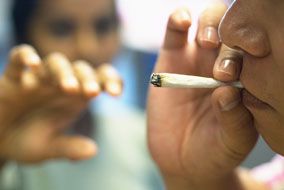Study Weighs Psychological Consequences of Teenage Alcohol, Marijuana Use
While high school seniors' marijuana use was linked to issues with authority, their alcohol consumption resulted in unsafe driving practices and strained peer relationships.

While high school seniors’ marijuana use was linked to issues with authority, their alcohol consumption resulted in unsafe driving practices and strained peer relationships, according to a study published online in The American Journal of Drug and Alcohol Abuse.
A team of New York University (NYU) researchers analyzed the data of 7,437 of high school seniors who reported lifetime alcohol or marijuana use. The data utilized by investigators delved into the students’ adverse psychological incidents, which was then compared for prevalence between the 2 substances.
Statistically, almost half of high school seniors have used marijuana and more than two-thirds have used alcohol, said Joseph J. Palamar, PhD, MPH, a NYU Center for Drug Use and HIV Research affiliated researcher, an assistant professor of Population Health at NYU Langone Medical Center, and the study’s contributor. However, Palamar also mentioned there is limited research available on the direct physiological effects of their use.
Based on their comparisons, the researchers discovered teenage alcohol users were more likely to have damaged close friendships and participated in unsafe driving. Among female alcohol users, there was also a higher rate of feeling regret.
“Compared to non-drinkers, frequent drinkers were over 13 times more likely to report that their alcohol use has led to unsafe driving,” Palamar said in a statement. “Marijuana users, compared to non-users, were 3 times more likely to report unsafe driving as a direct result of use.”
In addition, marijuana users had increasingly more difficulty dealing with authority figures, worse job or school performance, and decreased energy or interest. Overall, marijuana users were more likely to claim no adverse outcomes.
“Outcomes differ by sex and race/ethnicity, and perception or experience of outcomes may also be related to legal status and associated stigma,” the authors wrote.
Moreover, the investigators discovered no difference between alcohol and marijuana users’ lifetime police intervention rates. However, frequent marijuana users had a 23-time greater likelihood of getting in trouble with the police.
“Public health interventions may be more effective by focusing on harm reduction strategies for these drug-specific outcomes,” the authors recommended.